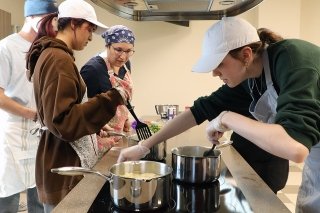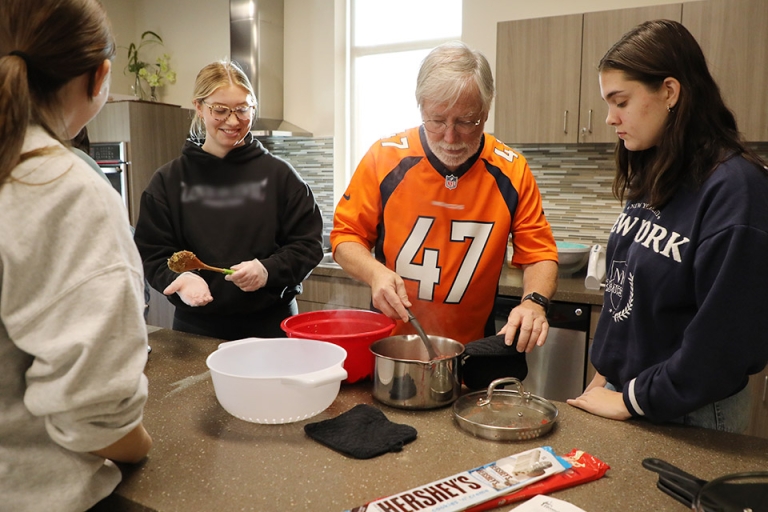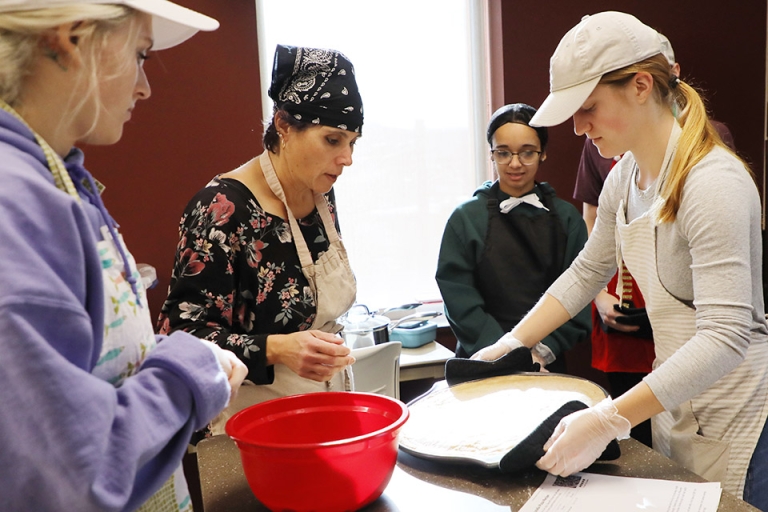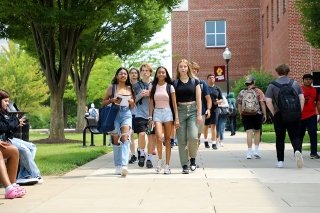Cooking Your Way to Success: The First Year Seminar
Posted:

With the numerous changes freshmen face coming to college, learning how to cook for yourself can seem impossible. Professors Michael Martin and Toni Bell teach a first-year seminar that instructs students on how to use what kitchen space they have available. “Cooking Your Way to Success” teaches basic cooking and baking skills, with each meal falling under $10.

The classes offer students a way to ease the transition between high school and college. Not just for learning basic skills, cooking next to professors can make it less daunting for freshmen to meet with teachers and advisors. “Language and food both influence and create identity for us as humans. Cooking and working together levels the playing field. We can talk with students and participate on an equal level,” says English professor Michael Martin.
“Cooking is chemistry you can eat. Learning what eggs do or what baking soda is and how it works is important when teaching the basics,” says chemistry professor Toni Bell. One aspect of the class is to let students learn what they want to make. Students have a say in what food they prepare. Certain dietary restrictions, allergies, and religious restrictions are considered and are an aspect of learning in the class. “It’s important to show how to substitute certain ingredients for others and have a fundamental understanding of ingredients.”
First-year students of all skill levels can enroll. Both professors emphasize how the seminar’s purpose is to learn, not to become an expert. “I’ve learned that you cannot assume everyone knows how to cut an onion, for example,” says Bell. “But we all learn from each other, building connections and making people feel included.”
“Cooking requires a certain amount of creative thought and willingness to make mistakes,” says Martin. “As a teacher, you want them to ask, how do we do this? Always ask questions.”
Both classes also emphasize food safety. On a class trip to Weis Markets, students met with the supermarket dietician and learned about food longevity, specifically focusing on how to safely store prepared food. “One of our requirements is to bring Tupperware,” says Bell. “All students are able to take what they make home and feed themselves.”
“You’d be surprised how many students struggle to get food every day, especially when considering how many students may be learning to live on their own for the first time,” says Bell. “Helping students figure out how to make meals is important.”
“Food allows someone to develop an identity,” says Martin. “If you can create healthy things on a budget that are flavorful, that are realistic for a college student, it is an incredible skill.”
Before Thanksgiving students prepared meals to celebrate the holiday. Working in groups, freshmen from both classes were able to make and eat

a feast with each other. “It’s like a cultural rhetoric class,” says Martin. “It facilitates understanding between students and opens up conversations about traditions.”
Both professors hope to get more faculty from all departments on board and create more cooking seminars for students. A similar class, taught by biology professor Jennifer Venditti, focuses on teaching students about baking, another option for students just coming to college.
“I see how my students are excited to cook and talk with each other,” Martin says. “There is a lot of joy in this class. I learned so many important things in there myself and I know the students have too.”



